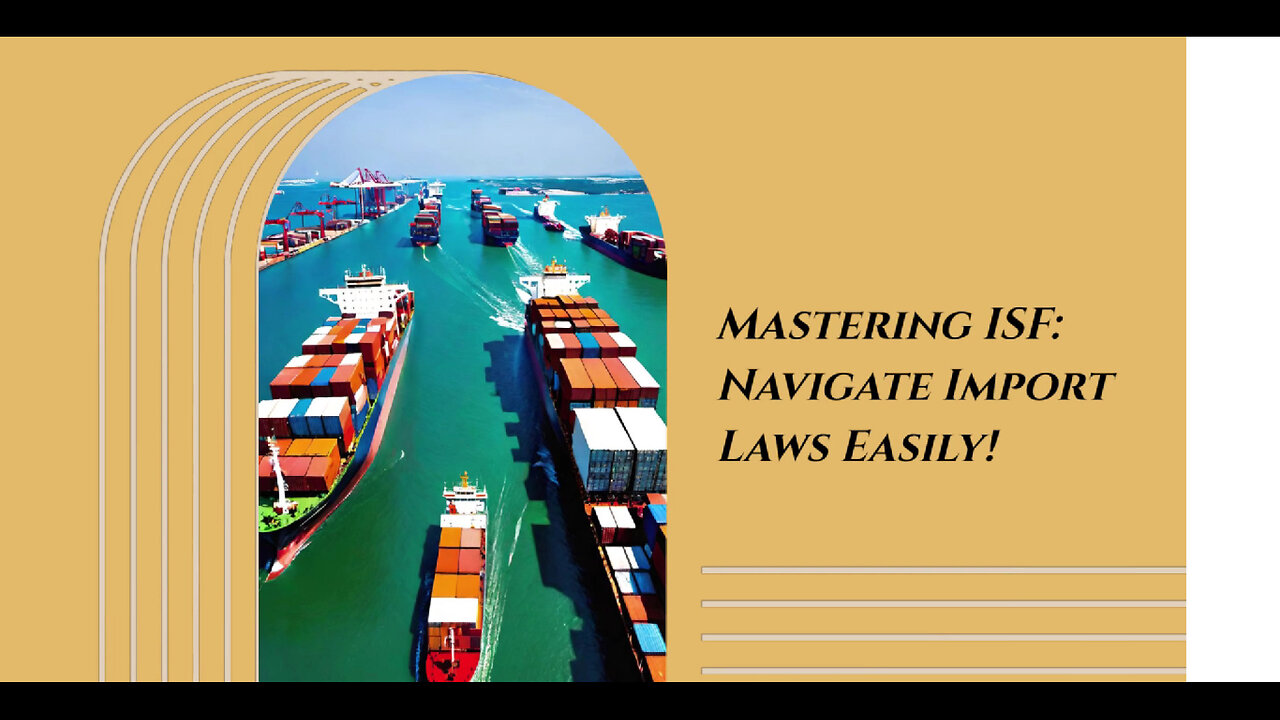Premium Only Content

Mastering Importer Security Filing: A Guide to Customs Bond and Compliance
License To Import // 323-578-6432 // file@licensetoimport.com // www.licensetoimport.com
In today's video, we delved into the legal framework surrounding Importer Security Filing (ISF) in customs brokerage. ISF, also known as 10+2, is a system introduced by US Customs and Border Protection (CBP) to enhance border security. It requires importers or their authorized agents to electronically file essential information about goods prior to arrival in the United States.
The legal requirement for ISF is that it must be filed at least 24 hours before the cargo is loaded onto a vessel. Failure to comply with this requirement can lead to penalties and delays in customs clearance. It is crucial for importers to understand and meet these obligations to ensure a smooth trade process.
A customs bond is a key component in the ISF process. It serves as a financial security mechanism for CBP, ensuring that importers fulfill their responsibilities, including the timely and accurate filing of ISF. In case of any violations or non-compliance, the bond provides protection to CBP.
Freight forwarders often act as authorized agents for importers in the ISF process. They have the expertise and knowledge to ensure proper ISF filing on behalf of their clients. Collaborating with a reliable freight forwarder can streamline the ISF process and help mitigate potential issues.
Recordkeeping is essential for importers. They are required to maintain ISF-related records for five years from the date of entry or release. These records serve as evidence of compliance in the event of audits or investigations conducted by CBP. Importers must establish robust recordkeeping practices to meet this requirement.
For importers who frequently bring goods into the country, a continuous bond is especially relevant. A continuous bond is an ongoing surety agreement that covers multiple shipments within a specific period. It simplifies the ISF process by eliminating the need to obtain a separate bond for each shipment.
Lastly, it is crucial to monitor and update the filed ISF as necessary. Amendments may be required due to changes in shipment details or the availability of new information. Promptly addressing amendments reduces the risk of penalties and ensures compliance with CBP regulations.
By understanding these concepts and the legal framework surrounding ISF, importers can navigate international trade more effectively while adhering to CBP regulations. Thank you for watching, and we hope you found this video informative. Stay tuned for more content focused on customs brokerage.
#usimportbond #isfcustomsbroker #uscustomsclearing #isfentry
Video Disclaimer Here: This video is solely for education and is not endorsed by any US government agency.
0:23 - Understanding ISF
0:49 - The Legal Requirement
1:11 - Customs Bond and ISF
-
 LIVE
LIVE
Vigilant News Network
23 hours agoRFK Jr. Hearing EXPOSES Corrupt Politicians in Humiliating Scandal | Media Blackout
3,233 watching -
 1:11:40
1:11:40
Josh Pate's College Football Show
4 hours ago $1.31 earnedPerfect CFB Conferences | Big Ohio State Changes | Canceling Spring Games | SEC 2025 Thoughts
19.7K -
 1:08:07
1:08:07
Bek Lover Podcast
2 hours agoInteresting Times with Bek Lover Podcast
5.29K -
 1:51:12
1:51:12
Tate Speech by Andrew Tate
6 hours agoEMERGENCY MEETING EPISODE 105 - UNBURDENED
130K64 -
 1:01:18
1:01:18
Tactical Advisor
8 hours agoBuilding a 308 AR10 Live! | Vault Room Live Stream 016
86.2K7 -
 2:17:02
2:17:02
Tundra Tactical
1 day ago $3.67 earnedTundra Nation Live : Shawn Of S2 Armament Joins The Boys
216K29 -
 23:22
23:22
MYLUNCHBREAK CHANNEL PAGE
2 days agoUnder The Necropolis - Pt 5
173K67 -
 54:05
54:05
TheGetCanceledPodcast
1 day ago $17.79 earnedThe GCP Ep.11 | Smack White Talks Smack DVD Vs WorldStar, Battle Rap, Universal Hood Pass & More...
174K36 -
 8:30
8:30
Game On!
12 hours ago $0.09 earnedLakers BLOCKBUSTER trade! Luka Doncic is coming to LA!
13.2K2 -
 48:29
48:29
hickok45
17 hours agoSunday Shoot-a-Round # 266
12.6K9